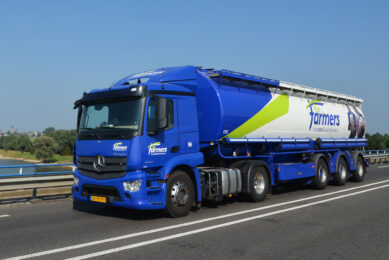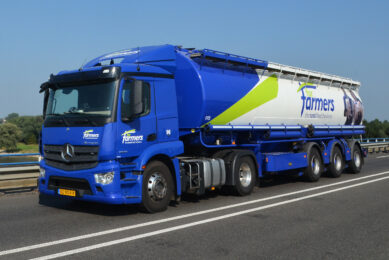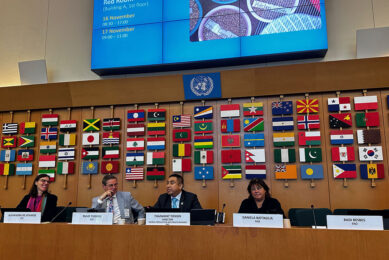Animal nutrition updates from around the world

What’s new in the global animal nutrition business? All About Feed wraps up the highlights from the last weeks.
Enterra gets approval to sell insect ingredients
Enterra Feed Corporation has received new approvals to sell its insect-based feed ingredients in the United States, Canada and the European Union. The Association of American Feed Control Officials (AAFCO) in the United States has agreed to Enterra’s request to include Black Soldier Fly Larvae Meal in feed for salmonids, which includes salmon, trout and arctic char, in their list of authorised feed ingredients. The supporting material and the change in the definition was reviewed and supported by the Food and Drug Administration (FDA). Enterra also received approval from the Canadian Food Inspection Agency (CFIA) to sell Enterra Whole Dried Larvae in Canada as a feed ingredient for tilapia and poultry, including chickens, ducks, geese and turkey. This builds on previous approvals for the same product in salmonid feed in 2017 and broiler chicken feed in 2016. Enterra is now registered in the EU Trade Control and Expert System (TRACES), which allows the company to export its insect feed ingredients to all member countries of the European Union. New EU regulations came into effect on 1 July 2017 to permit the use of insect ingredients in aquaculture feed. Approvals for poultry and pig feed are expected to follow.
With production at its Langley facility at maximum capacity, Enterra is planning to expand to a second, larger facility near Calgary, Alberta, Canada in Q4 2018. The company is also developing additional facilities in the coming years to keep up with demand for its sustainable feed ingredients. More applications are currently in process for Enterra’s products to serve additional markets in the USA and Canada.
Trouw Nutrition develops feed advisory tool
Dutch Sprouts, developer of the SoilCares handheld scanner, and Trouw Nutrition, a global leader in animal nutrition solutions, have been working together to develop the NutriOpt On-site Adviser. This product enables farmers, integrators, compound feed industries and consultants to analyse all kind of raw materials, silages and feeds for a large range of nutrients with a mobile NIR on-site and in real-time. Dutch Sprouts/SoilCares has developed scanning technology that connects to a cloud-based database to determine the chemical characteristics of soil. The collaboration between both companies now, enlarges the application of this technique to the analysis of raw materials and feedstuffs. Through the mobile app the user gets immediate nutritional advice regarding the use of the raw material in feed formulations.
Niacet Corporation re-enters the animal feed market
Dutch company Niacet Corporation announced that it will re-enter the animal feed markets in EMEA and APAC with its effective March 1, 2018. The Calprona® portfolio consists of: calcium propionate, sodium propionate, calcium acetate, magnesium acetate and zinc acetate. Also for the Americas the company will re-launch its activities in animal feed. The products are used for spoilage prevention, feed-safety and animal health.
Anaqua to unify and simplify Ceva’s IP management
Anaqua, Inc., provider of intellectual property management software and services, announced that animal health company Ceva Santé Animale, has entered into a multi-year agreement to use the ANAQUA IP platform to manage its global portfolio of patents, inventions, trademarks, and awards.
With a sizeable and growing portfolio of patents, trademarks and inventions, Ceva was seeking to upgrade its IP management systems and bring all of its IP assets onto a single platform, thereby increasing efficiency, saving time and reducing costs. Anaqua’s software will manage all of Ceva’s IP assets through a sole system across the entire company. It will substantially automate and streamline daily docketing operations and provide flexible, reliable and updated reporting tools for its IP decisions.
Neovia joinx forces with Pilardière
Neovia announced the acquisition of the Pilardière group, which is the third largest producer of mineral feeds and nutritional specialities on the French market. This acquisition will allow Neovia, through its Wisium France business, to strengthen its leadership on the French premix and firm-services market. It will also supplement the company’s expertise in manufacturing high value-added products and services. Effectively, in addition to its main business of manufacturing customised minerals, the Pilardière group also has strong expertise in manufacturing salt licks for ruminants. This manufacturing process will supplement Neovia’s industrial expertise and its offering of licking buckets and other speciality ingredients.
InnovaFeed gets 15 million Euros in funding
InnovaFeed, producer of insect protein for aquaculture, secured € 15 million through funding with AlterEquity3P, Finovam Gestion, Nord Création (Group IRD), Nord France Amorçage (advised by Siparex) and several entrepreneurs. Following the launch of its 1st industrial production site mid-2017, this new financing round will enable InnovaFeed to deploy a second production unit ten times larger, accelerate product commercialization and contribute to the growth of a sustainable food industry. InnovaFeed’s insects are fed with by-products from the agro-industry, enabling a short loop valorisation of resources which are widely available and with few outlets. Through this virtuous cycle, InnovaFeed creates value that benefits the local economies around its production sites. Its first factory, located in the Hauts-de-France Region is currently the largest insect production facility in Europe with a capacity of 1,000 tons per year.
Bühler achieves strong, profitable growth
2017 was a successful year for the Bühler Group. Bühler organically increased its order intake by 10% to CHF 2.8 billion (€ 2.43 billion), its turnover by 9% to CHF 2.7 billion (€ 2.35 billion), and its EBIT by 18% to CHF 205 million (€ 178 million) (EBIT margin: 7.7%). The Grains & Food businesses increased its order intake and turnover by 7%. Market share gains were achieved in particular by milling, feed, optical sorting, aluminium die casting, and optical coatings. In regional terms, order intake growth was especially pronounced in the Middle East & Africa (+48%) and Asia (+18%).
Symposium: Edible insects: The value chain
The symposium “Edible Insects: the value chain” will be held on 21-22 March 2018 in Wageningen, the Netherlands to celebrate 10 years of insect research and insect industry in the Netherlands. Researchers of Wageningen University & Research, entrepeneurs and other stakeholders (e.g. food safety authorities and politicians) in the industry will present the latest insights and findings related to the applicability of insects as a novel protein source considering different steps of the value chain.
New books on feed evaluation and feeding systems
Wageningen Academic Publsihers has launched 2 new books. Feed Evaluation Science has been edited by Paul J. Moughan and Wouter H. Hendriks. This book is a must-have for students, researchers, postdoctoral fellows and teachers of animal nutrition, as well as practitioners in the feed industry. The text offers a classical treatment of the basic principles and new developments in feed evaluation for simple-stomached animals with emphasis on pigs and poultry. The book INRA feeding systems for ruminants is a renewed version of the previous one to better address emerging challenges for animal nutrition: prevision of productive responses, product quality, animal health and emissions to the environment, in a larger extent of breeding contexts. The new system is mainly built from meta-analyses of large data bases, and modelling. The dietary supply model accounts for digestive interactions and flows of individual nutrients, so that feed values depend on the final ration. Animal requirements account for variability in metabolic efficiency. Various productive and non-productive animal responses to diets are quantified.












